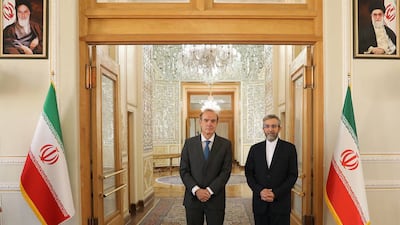Iran has agreed to resume talks with world powers on reviving their nuclear deal on November 29, after a five-month gap.
After the agreement on Wednesday to renew negotiations, the US urged a quick resolution.
The indirect negotiations in Vienna come amid mounting pressure on Iran, with western nations warning that Tehran's nuclear work was advancing to dangerous levels and Israel threatening to attack.
EU envoy Enrique Mora, who led six rounds of talks this year and recently flew to Tehran to seek progress, will again chair the November 29 meeting, the bloc said.
US President Joe Biden took office hoping to return to the 2015 agreement from which his predecessor Donald Trump withdrew.
But the talks this year failed to secure a breakthrough with Iran, which requested a pause after the June election of a new hardline president Ebrahim Raisi.
In Washington, State Department spokesman Ned Price said that the US believed it was possible to quickly resolve the "relatively small number of issues that remained outstanding at the end of June".
"We believe that if the Iranians are serious, we can manage to do that in relatively short order," Mr Price said.
"But we've also been clear, including as this pause has dragged on for some time, that this window of opportunity will not be open forever."
Mr Trump imposed sweeping sanctions on Iran as he withdrew the US from the deal in 2018, leading Tehran to breach its terms in enriching more uranium at greater levels.
Iran wants all US sanctions to be lifted before talks but the Biden administration says it will only negotiate Mr Trump's sanctions related to the nuclear programme, such as a unilateral ban on oil sales, not steps imposed over other concerns such as human rights.
Iran also wants commitments that the US will stay committed to the deal, which is unlikely in Washington, where Mr Trump's Republican Party, emboldened by a state election win on Tuesday, opposes Mr Biden's diplomacy with Iran.
"The American president lacks authority and refuses to offer guarantees," Iran's top security official Ali Shamkhani wrote on Twitter as the talks were announced.
"If that does not change, the result of the negotiations is already clear."
Deputy foreign minister Ali Bagheri, Iran's lead negotiator, confirmed the November 29 resumption of talks and said the goal would be "the removal of unlawful and inhumane sanctions".
Adding to US frustrations, Iran has refused to meet directly with US envoy Rob Malley, meaning European mediators will again keep moving between hotels in Vienna.
Britain, China, France, Germany and Russia remain in the deal with Iran and will take part in the negotiations, the EU said.
The European powers have increasingly voiced alarm at Iran's nuclear work amid the standstill in negotiations, warning that Tehran's progress will be so advanced that a return to the agreement will be useless.
Israel has been widely suspected in a sabotage campaign that has included the assassination of Iran's top nuclear scientist a year ago.
On a visit to Washington last month, Israeli Foreign Minister Yair Lapid warned that it would not hesitate to use force against Iran, whose rulers have repeatedly threatened his country and back anti-Israeli movements such as Lebanon's Hezbollah.
The Biden administration has increasingly spoken about an unspecified "Plan B" of pressure if Iran fails to address concerns.

